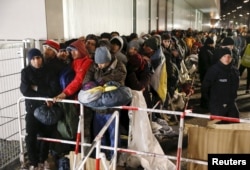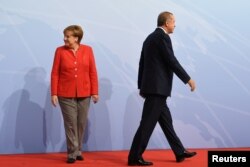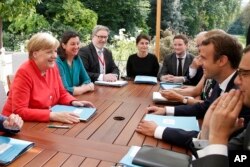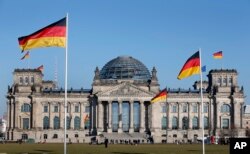German Chancellor Angela Merkel’s center-left challenger Martin Schulz failed to land a blow Sunday in the German election campaign’s one and only TV debate between party leaders.
A relaxed chancellor easily parried the attacks from Schulz, whose Social Democrats (SPD) have propped up Merkel’s conservatives in a "grand coalition" government since 2013.
With three weeks to go before the polls Schulz, a former European Parliament president, has been unable to engineer momentum to close a big gap between his party and Merkel’s conservatives, who in the latest surveys enjoy a 14 percent edge.
Migrants, Turkey
Schulz attacked Merkel for her 2015 decision to throw open Germany’s borders for mainly Syria asylum-seekers stranded in Hungary, arguing that she should have consulted Germany’s neighbors before making a decision that triggered central European leaders to close their borders, placing an even greater burden on Germany.
Merkel responded that she had to take a quick decision to relieve a growing humanitarian crisis, “In the life of a chancellor, there are moments when you need to make decisions.”
Schulz also took aim at the Chancellor’s handling of Turkey amid rising tensions between the two countries, which are currently in yet another stand-off, this time over the arrests of a dozen German citizens.
But the center-left challenger’s barbs on Turkey didn't shake Merkel, and allowed her to appear tough on Ankara by announcing a new position on Turkey’s bid to join the European Union, saying, “The fact is that Turkey should not become an EU member.”
Merkel's performance
Polls during and immediately after the one-on-one debate aired by all four of Germany’s main broadcasters showed voters saw the confident Merkel as more credible and likable than the hesitant Schulz. One poll found 44 percent found Merkel more convincing than Schulz, whom only 32 percent found convincing.
Commentators faulted Schulz for failing to press Merkel, who has been in power now for 12 years, on some of the key challenges Germany faces — including renewing the country’s infrastructure, education and how the country will handle growing defense responsibilities. He chose to be more aggressive on foreign policy than on the domestic issues that trouble many Germans and clashed for several minutes with the Chancellor over motorway tolls, hardly a populist issue that can swing an election.
“This was Mr Schulz's one big chance to change the direction and narrative of the election campaign, and he blew it,” judged the Economist magazine. The Social Democrats partly chose Schulz to be their candidate because his tenure in Brussels meant he would be in a better position to criticize the chancellor than others in the party who have had to work with her. But he appeared not to use that advantage in Sunday’s debate.
A year ago Germany’s veteran leader appeared to be in trouble with her popularity plummeting in reaction to her handling of the migration crisis roiling Europe. But after the election of Donald Trump in the U.S. her poll numbers started to climb again. Her aides jokingly explained the improving poll ratings as due to "the Trump factor.”
She seemed also to get a lift from political turmoil in Britain following the Brexit referendum. Instability elsewhere appeared to be pushing Germans to favor continuity and sticking with experience and positioning Merkel in a strong position for this month’s federal election.
One of the key questions, though, as Germany heads into the home stretch of campaigning is who Merkel will decide her right-leaning Christian Democratic Union should partner with to form a coalition government.
Seeking partners
As the CDU will not secure sufficient seats in the German Bundestag to govern alone it will either have to partner once again with the Social Democrats or with the Free Democrats and Greens and that may have major consequences for Germany’s position on European Union reforms being proposed by French President Emmanuel Macron.
The electoral performance of Germany’s far-right anti-immigrant party, Alternative for Germany, which likely will become the third-largest faction in the German parliament after the September 24 election, could well have a bearing on the Merkel’s choice of coalition partners for her fourth term in office, say analysts.
While the AfD has failed to shape a right-wing populist wave, it will, according to the latest opinion polls, break the threshold needed to secure seats in the Bundestag. Polls give the far-right nationalist party about an 11 percent share of the vote, which would translate to about 60 Bundestag seats.
But as it tries to reshape itself as more of a political party than a protest movement, the AfD hasn't backed away from Islamophobia, presumably having decided that it needs to consolidate its base rather than to try to try to reach out to a wider public. It has run throughout the campaign what critics charge has been inflammatory advertising. One of its election posters depicts two women wearing skimpy swim-wear with the tagline: “Burkas? We prefer bikinis.”
Another recalls Nazi propaganda, with a smiling, pregnant German under the caption: “New Germans? We’ll make them ourselves.”








